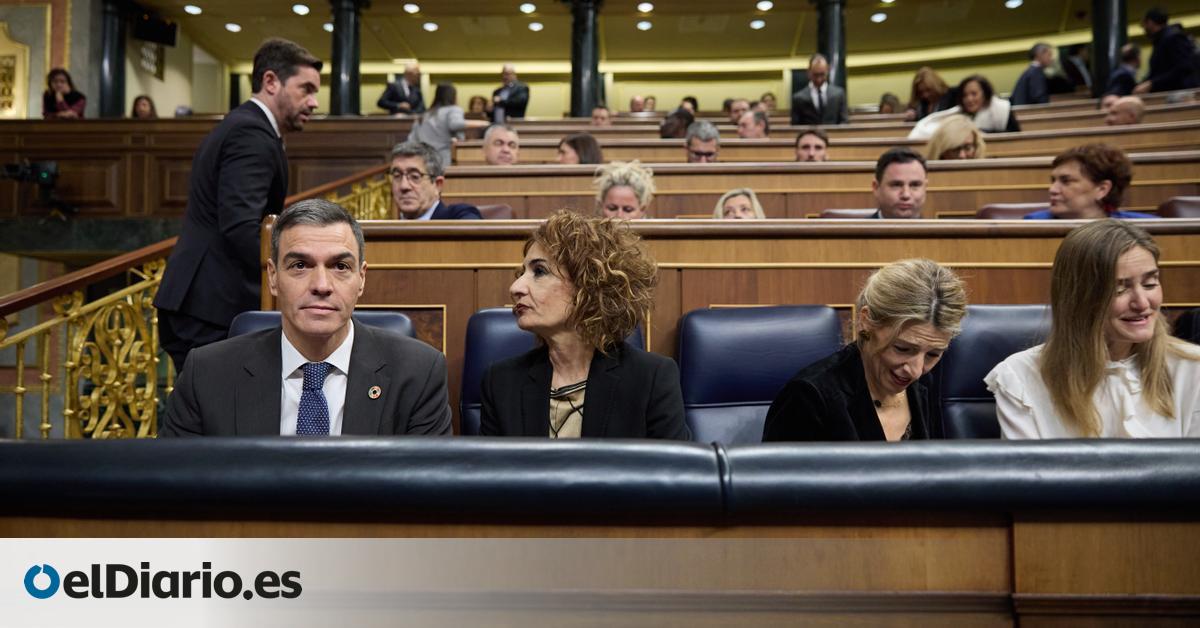
It is common for the opposition to accuse the Government of paralysis due to its parliamentary minority and it is also common for the Executive to claim that, even in these circumstances, it has been able to pass 25 laws so far in the legislature. But in Moncloa they know that legislative production is not exactly one of the strong points of Pedro Sánchez’s mandate marked by two issues: the amnesty law and the lack of a progressive majority in which to support a true reformist agenda, as yes. promoted in the last legislature. Because quite a few of these pending reforms also put stress on some of the groups that have to support them in Congress.
In recent weeks, Sumar and other progressive formations have directly accused the PSOE of dragging its feet with the push for some of the commitments to be fulfilled and which are clearly left-wing. This is the case, for example, of the reduction of the working day to 37 and a half hours, a measure that has publicly pitted Vice President Yolanda Díaz against Economic Minister Carlos Body.
The head of Labor went so far as to accuse her colleague from the Council of Ministers of “deceiving” citizens for defending that this reduction be carried out in a “gradual” manner. In addition to the purely ideological clash, also common between the Economy Ministry and the left-wing coalition partners, in the background a very delicate budget negotiation is planned for many parties that the PSOE wants to shield from any external complications.
The socialists allude, without going any further, to the latest episode faced with the tax reform. The house of cards that they were able to build to push forward in committee a package of tax measures that promised some partners exactly the opposite of what was promised to others ended up partially collapsing a couple of weeks later in the Plenary. Conservative allies such as Junts and PNV distanced themselves from the investiture majority to align with the PP and managed to lower extraordinary taxes on large energy companies.
In the ranks of the Government, they defend, however, that the bulk of the tax reform managed to move forward. And they are confident that the parliamentary partnership of the right with the Basque nationalists and the Catalan independentists is “anecdotal.” But even so, the PSOE is tempting its clothes before any other false step that could add even more fuel to the negotiation of the General State Budgets, the true political priority for Pedro Sánchez upon returning from the Christmas holidays.
Carrying out these accounts is the true obsession of Moncloa. No matter how much the president’s team tries to establish the idea that the Budgets that are in force would keep the Government afloat, no one in the coalition truly believes that it is politically viable to sustain a long legislature without being able to approve at least some accounts. . And that is why all negotiating efforts will focus right there starting January 7.
The last messages released before the holidays by Carles Puigdemont, who despite his irrelevance in Catalan politics maintains control of seven key deputies for Pedro Sánchez’s governability, did not leave much room for optimism. The leader of Junts threatened once again to bring down the Executive, this time if the president did not accept his group’s imposition of submitting to a question of confidence. The PSOE preferred to avoid the toad to give room, once again, to be able to redirect the conversations with Switzerland.
After airing his reproaches about the non-compliance with the signed agreements that in his opinion Sánchez incurred, Puigdemont came to show his conviction that the negotiation on the Budgets would not even take place. And the next thing that happened was that its seven deputies joined their votes in Congress to the PP, Vox and the PNV to reduce taxes on large electricity companies against the Government’s criteria.
The political strategy of the former Catalan president since he has been reinforced at the head of his party’s leadership is clear: a speech with a markedly right-wing ideological load on issues such as immigration, whose delegation of powers he negotiates with the Government, and the economy. In this last chapter, and after skirting independence demands, Puigdemont’s plan to recover his lost influence involves becoming the political representative of the Catalan employers’ associations, something that was evident in the negotiation of the tax reform.
Adding puts a rush
None of these extremes is ignored by the PSOE, which privately assumes that the reduction in working hours will end up being carried out in terms very similar to those demanded by Yolanda Díaz, but also highlights the importance of the times and the balance between the political forces from which it needs support in Congress. A temptation that, however, scares more and more progressive partners, such as ERC or Podemos, mainly, which disfigures the PSOE by constantly “folding” “to the right” to hinder clearly left-wing reforms.
From Sumar, Yolanda Díaz herself has interceded directly with Junts and PNV in search of the necessary support to carry out her great reform of 2025. Neither Basques nor Catalans have directly opposed reducing the working day to 37 and a half hours, although in the In the case of Puigdemont, they put on the table direct aid to small and medium-sized companies and a gradual introduction of the new standard for these SMEs.
For weeks now, Pedro Sánchez’s coalition partner has been intensifying his demands for a reformist agenda that would make the Government resume the political initiative, now subleased by the opposition to the courts in the midst of a judicial offensive against the Executive. Those of Yolanda Díaz demand, in addition to the working day, that the annual increase in the Minimum Interprofessional Wage be implemented now or that the rental market be decisively intervened to control housing prices.
Source: www.eldiario.es

